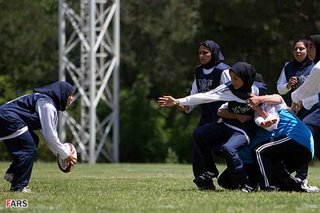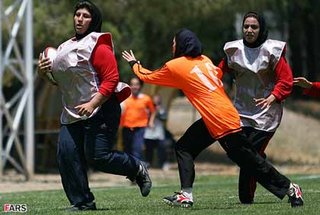Well... I, for one, would definitely think twice before I try to oppress Iranian women who play rugby football:




The pictures are from a series of national tournaments in various sports currently being held in Iran. True, the women are dressed in an extremely modest manner, showing no "skin" whatsoever. In my opinion, only voyeurs and misogynists object to modest dress in women.
Humanity is very far from achieving equality for women, or for men for that matter. At the same time, the American propaganda about the situation of women in Iran is no more than the usual bunch of lies that are meant purely to serve American interests. Iranian women are no more or less oppressed than women in any other part of the world.
For good measure, here are a couple of pictures from an Iranian fashion show:


10 comments:
That's rugby that they're playing. But that's inconsequential. Your point is valid. Why must women be scantily clad in order to be liberated? It is a very ethnocentric view. But it applies conversely when Muslims critique western culture. Why must women be covered up in order to be pious? So its a double edged sword - neither side is completely correct in their respective prejudices. That's the nature of prejudice, of course - seeing what one what one wants to see.
Civitas, piety is irrelevant. The point here is that the West wants to impose its standards – which have nothing to do with either piety or liberation, but are rather about politico-economic hegemony – on the rest of the world.
Thanks for the correction about the difference between rugby and American football. Spectator sports are a mystery to me.
Look at this parallel case, IshtarTerra. The stereotypes that black people hold about white people don't cause any harm to white people. BUT the stereotypes that white people hold about black people cause a lot of harm to black people by depriving them of employment opportunities and so on.
In the same way, the stereotypes that Iranians hold about Americans don't cause any harm to Americans. BUT the stereotypes that Americans hold about Iranians can be used by the US Government as an excuse to make war on Iran. It is therefore urgent to fight the stereotypes and misconceptions that are commonly held by Americans about Iran.
As to your point that the West wants to "impose" certain standards in order to "liberate" eastern women, I don't really understand what you mean. Do you really believe that people can be liberated by force?
I think that stereotypes even by those without much power can still cause harm, although you have to look pretty hard to find an example.
The fact that you used rugby is sort of interesting. Rugby is very much like American football, only you don't wear any protective equipment. In order to do it well, it requires a level of reckless aggression that in a way kind of mirrors US foreign policy.
Apropos your comment, Immoral Majority, please see my post of December 24, 2004.
I think there is some confusion here regarding the legitimate misunderstandings that invariably do occur between cultures, and the polticization of these differences for political gain. First, the United States use their ethnocentric position to justify and "sell" the programme of liberation to the folks at home. In Afghanistan, the entire notion of providing a better life for women was an initial justification - to get confused feminists to legitimate, if only briefly, that specific conflict. And in Iran, a few photos could mean a lot or nothing at all. Some may show rugby and fashion shows. Others may depict exploitation and abuse of women. Neither can be confirm or disconfirm the stereotypes they purport, because they are images captured at a specific site, at a specific time, and - whether it is explicit or not - for a distinct purpose. All societies have the quality of complexity, imbued with paradox and contradiction. The problem may be that the United States is exporting a stilted and illusory version of their "free society". But it is most likely that the United States as an administration and a nation has refused to confront the contradictions inherent within itself. Same is true of Iran, Israel, or Venezuela. Each side purposes a rhetoric of "greatness"; the nation is great, the nation is grand. And most pertinent of all illusions - that We are under constant threat from the outside world. And in short, "We" are better than your repression, your colonization, your terrorism, your (fill in the blank). You say it often enough; it becomes self-fulfilling. Taking that combative approach only feeds the vitriol that fuels the political machinery that craves conflict and perpetual discord. Maybe a different approach is needed - more attuned to the "shades of grey", rather merely black and white.
Civitas, I don’t agree with the relativism that I think is implicit in your position. There is such a thing as oppression, and, to paraphrase Marx, we must try to understand it if we want to help create a better world. No form of oppression or exploitation is justifiable. For instance, there is a large advertising billboard near where I live that depicts a half-naked woman in order to sell some kind of skin product. Does the exploitation of this woman, and of all women through her, fall into some kind of indeterminate “grey” area? I wouldn’t say so.
Equally as important is that we should be conscious of the fact that we perceive all phenomena through the imposed filter of capitalist ideological propaganda.
If there is any kind of valid relativism, it applies to a comparative understanding of social institutions and oppression between different countries. For instance, the Iranian socio-political system is based on attaching greater weight to society’s rights as opposed to those of the individual. The reason for this choice has to do with the specific historical conjuncture that Iran finds itself in, namely, the requirement to protect its social revolution within the context of imperialist encirclement. A parallel analysis may be applicable to the forms of oppression and exploitation that Western women suffer from, albeit within a context of individual "freedom."
I really can't agree that there is relativism in whatever may be considered my "argument" - it wasn't really an argument, just a cautionary tale about universalism. No, I'm just saying that the woman on the billboard isn't necessarily exploited. I really can't go up to her, where ever she might be and "tell her the truth", that she is a tool of modern capitalism and exploited individual. Because, like a great philosopher once said, "let he without sin cast the first stone." I cannot impose my truth upon her - that is tantamount to an intellectual trangression. You can call on her to reconsider the grounds of her choices, and let her figure it out. I guess your implying that there is a moral relativism present in my "argument". I wouldn't say its relativism. I would like to say its a critical relationship with the world, to be able to consider the various perspectives that have their merits and pitfalls - like any perspective. The 180 to this "relativism" is dogmatism - something I consider far more hazardous, because it provides a comforting parochialism - wherein one can find the truth in doctrine rather than in life. I trust in life. I distrust doctrine.
To see all phenomena through the supposed filter of "capitalist ideological propaganda" only feeds a phenomenon that operates on a viral level. Like I have said before, "we", whatever we can be, must redefine the grounds for discourse. It is the architecture of resistance that precedes any percieved ideological moves. How does one transform the architecture of resistance? It requires that one does not fall into the comfortable categories that "captialist ideological propaganda" have traditionally exploited. I requires that "we" look at a term like "capitalist ideological propaganda" with a critical approach, to see it isn't totalizing in-of-itself - it only becomes totalizing once "friends" and "enemies" alike come to accept it as the present exisent condition. They don't have to throw you into the iron cage if you willingly walk into it. Part of that is the relative difficulty of language. You cannot communicate a "coherent argument" without clear language, nomenclature that is somewhat clear and apparently incisive. But the terms "global hegemony" and "ideological propaganda" are seen as absolutely hollow to people in general. It isn't necessarily because they are compromised by propaganda. Because ideology is at times merely the secularization of religious categories - see Ludwig Feuerbach, and we all know how well we take to Jehovah's Witnesses knocking on our doors. The problem, as abstract as it may sound, is indeed in the epistemological foundations of modern societies - this is inclusive of nations of Islam; namely that the individual as individual or the collective society as individual needs to be considered in a paramount place, for the political formation to have any clarity. It isn't the case - but someone has to tell Stephen Harper that Canada is not U.S.A junior.
In short, yes, there is oppression and conflict. Both, sadly, are part of the human condition - the ebb and flow of what is at once great and tragic about life. It is great that we are all born free, but everywhere we are in chains, with no spaces to exercise that freedom - left on a terrain largely constructed by those in power, unable to step out of a political illusion that is so readily accepted. This illusion is not the specific occurences of propaganda - that is often the smokescreen in front of the curtain. The illusion is that we have to take sides in that great apocalyptic battle between "us" and "them"; between "righteousness" and "oppression"; between the "Great Satan" and "Children of Allah". The reign of the political is indeed illusion. Venom only feeds venom - until all is consumed.
Civitas, I wasn’t using the word relativism in the sense that conservatives use the word. In fact, I was using it in a contrary sense. When a liberal or a progressive refuses to assign a reified idealistic sense to ethical/moral terms, and insists on empirical evaluation of the specific issue at hand, conservatives accuse him/her of “moral relativism.”
The relativism that I have in mind is the post-modernist kind that rejects the absoluteness of the correspondence between material processes and their concepts. That is why I said, for instance, that oppression is real, and not just something that may look like oppression one day and like something else the next day or from another point of view. In other words, if a philosophy fails to recognize oppression as oppression, then that philosophy is wrong.
There are conflicts that do arise between groups of people - this is rather unavoidable. You live within the world, invariably conflict will arise. One must come to acknowledge and address the real conflict in order not to allow it to grow to epic and distorted proportions, providing fodder for political machinations.
What I am "contending" is certainly not a Baudrillard-Borges postmodern simulacrum upon simulacrum, where no grounds are readily present. The existentialism inherent in my words is definitely not the solipsistic account of Sartre, but rather more akin to Camus'. Oppression is real. It does exist. Whether or not I can see it is irrelevant to its presence in the world. Oppression is represented by faces, i.e. George Bush, concepts - global hegemony, and ideas - globalization. Indeed, the absolute relationship between material processes and concepts does not exist in the world - even Plato would admit. For the concept of a Republic does not being on this earth, it exists merely on a transcendental plane. The concepts and ideas are imperfect descriptions and prescriptions for an existent condition. That is the point I wanted to convey. The term itself is perfect. To accept a term, a word, or a process as somehow infallible is, as Lukacs said, to reify it. Reification, I don't have to explain, leads away from genuine human thought about their general conditions. Hence, a concept does not perfectly describe a current material process it corresponds with. That much I can admit. But rather than leading to relativism, it hopefully leads to a redefinition of the concept-idea. The idea-concept that stagnates, that is accepted as absolute, becomes anachronistic.
The main point, if there is a point to what I am saying, is that oppression, repression, or the exercise of political power is beyond just raw force. Hence, in order to confront oppression, one must not simply see the concepts already constructed to describe it, but rather engaging with others about the complexity of the situation. To act politically is not to throw ourselves out as "soldiers" for one Cause against another - that is making a stand, but merely capitulating to the logic of oppression - friend-enemy. To make a stand is to state that neither side is absolutely righteous or inexorably evil.
The U.S. government may be hazardous and malicious in its policies, but the American people on a whole cannot be demonized. Conversely, the Iranian state is not the the repressive regime - that the West purports it to be, but it is not without fundamental flaws itself. And all one can do is to make a stand for life - believe in life, in the human spirit, and see life as it is, between peoples with differences whom nonetheless share a existent condition. And in doing so, people can come to reject the myths spun by both sides - living the truth rather merely following truth-concepts, which describes experiences of a given time and place. We do not live in the eternal world of forms; the correspondence between concept and reality is invariably flawed.
Post a Comment